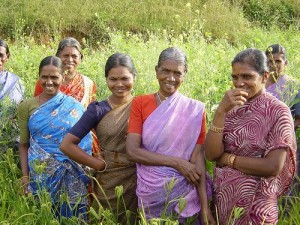Women Are Bringing Hopes to Rio+20
Jun 14th, 2012 | By admin | Category: Rio+20 Earth SummitBy Suzanne York, howmany.org, June 14, 2012
The past month or so has seen the release of several reports and studies focused on the state of the planet. The timing coincides with the run-up to the United Nations Conference on Sustainable Development, or Rio+20 Earth Summit.
Most of the publications are on the increasingly dire environmental situation in which we humans find ourselves, mostly of our own making. All basically conclude that we are nearing a planet-wide tipping point.
Much of what comes out of Rio will probably echo this theme. As welcoming as it would be to hear positive reports from the official conference, that isn’t likely to happen. If, by chance, the delegates in Rio actually agree on a final outcome document (currently far from agreement in certain areas), the text will probably be watered down and only pay lip service to obligations governments must undertake to forestall further environmental degradation.
All the more reason to listen to the people outside the official talks. Especially women, and supporters of women’s rights.
Recently I was on a conference call with some amazing women who are participating in Rio+20 – Musimbi Kanyoro of the Global Fund for Women, Carmen Barrosa of International Planned Parenthood Federation, and Sandeep Bathala from the Woodrow Wilson International Center for Scholars. Despite the bleak reports, or perhaps in spite of them, they are all focused on getting the voices of women and marginalized peoples heard at Rio and beyond.
Barroso said that today people feel that the planet is close to the tipping point and there is a greater sense of urgency. Yet she is bringing hope to this UN conference. “I’m not as pessimistic because I have seen on the ground the influence (of international policies) such as the Convention on Ending Discrimination Against Women”, something she considers an important weapon for women’s rights. And, she believes, the increasing energy of young people who want a seat at the table will be a big factor.
Bathala stated that “you can’t talk about sustainability if you don’t include half the world’s voice.” It is important to elevate discussions on how climate change impacts women differently, and to recognize that women are major part of the solution.
According to Kanyaro, we need to highlight how issues such as urbanization, energy, food, nature and poverty are all connected to people, population growth, and our planet, and all hinge on reproductive health rights. “If the world wants to talk about population, it knows women have the key.”
Given the preponderance of doom and gloom reports and reporting, I asked the speakers how they might respond to this. Kanyaro gave me the answer that we all should heed; she said she ignores the negative reports and works instead to create and share messaging on positive actions women around the world undertake every day. Earlier in the call she mentioned promoting new stories and new voices as a way to create a much more wholesome way of reporting, and include not only women’s voices but that of indigenous communities and youth, groups who haven’t had any airtime in the past but are bringing forth new actions and initiatives.
The draft document for Rio+20 is called The Future We Want, and no one wants to accept a bleak outlook. The future the world really wants will be on the streets of Rio and at the UN side events. This is a future that includes rights-based solutions that empower people and communities and protects the planet. One with a greater understanding of the connection between reproductive health rights and a sustainable world. “The health of the planet and people”, said Bathala, “is reinforcing.”
Suzanne York is a senior writer with the Institute for Population Studies/HowMany.org

